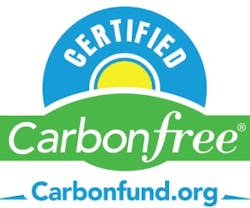Carbon Neutral Product Certification Released
North America’s first carbon-neutral certification program provides an easy point of reference for environmentally friendly products.
Carbonfree, a partnership between NSF International’s Sustainability division and carbonfund.org, covers building materials, office supplies, electronics, and more, offering credible, easily accessible information to consumers. The program uses lifecycle assessments (LCAs) and its own certification protocol to determine each product’s greenhouse gas emissions over its entire lifecycle.
Any emissions that can’t be reduced or eliminated from the lifecycle must be offset or neutralized quarterly (based on actual sales) using third-party-validated renewable energy, forestry, and energy efficiency carbon offset projects.
Units of carbon displaced or removed from the atmosphere as a result of such projects are translated into credits, which companies can buy to offset the carbon released as a result of producing and selling each product. These credits are retired after purchase so that the carbon is essentially eliminated from use, according to NSF.
Once a product passes this process, it earns the use of the blue and green Carbonfree mark and a listing in carbonfund.org’s product certification database, available at carbonfund.org/cabonfree-certified-products. The certification must be renewed annually, ensuring ongoing compliance.
“The Carbonfree Logo is widely recognized as a preferred mark that assures a comprehensive and high quality process was used to achieve carbon neutrality,” explains Eric Carlson, president of Carbonfund.org. “More companies are recognizing the importance and value of offering carbon neutral products.”
NSF Sustainability is a division of NSF International focusing on green products, operations, systems, and supply chains. It conducts testing and certification for sustainable products and develops sustainability standards for carpet, flooring, and other commercial building materials.
The Carbonfund.org Foundation is a nonprofit climate solutions organization that supports renewable energy, energy efficiency, and forestry products to reduce carbon emissions.
